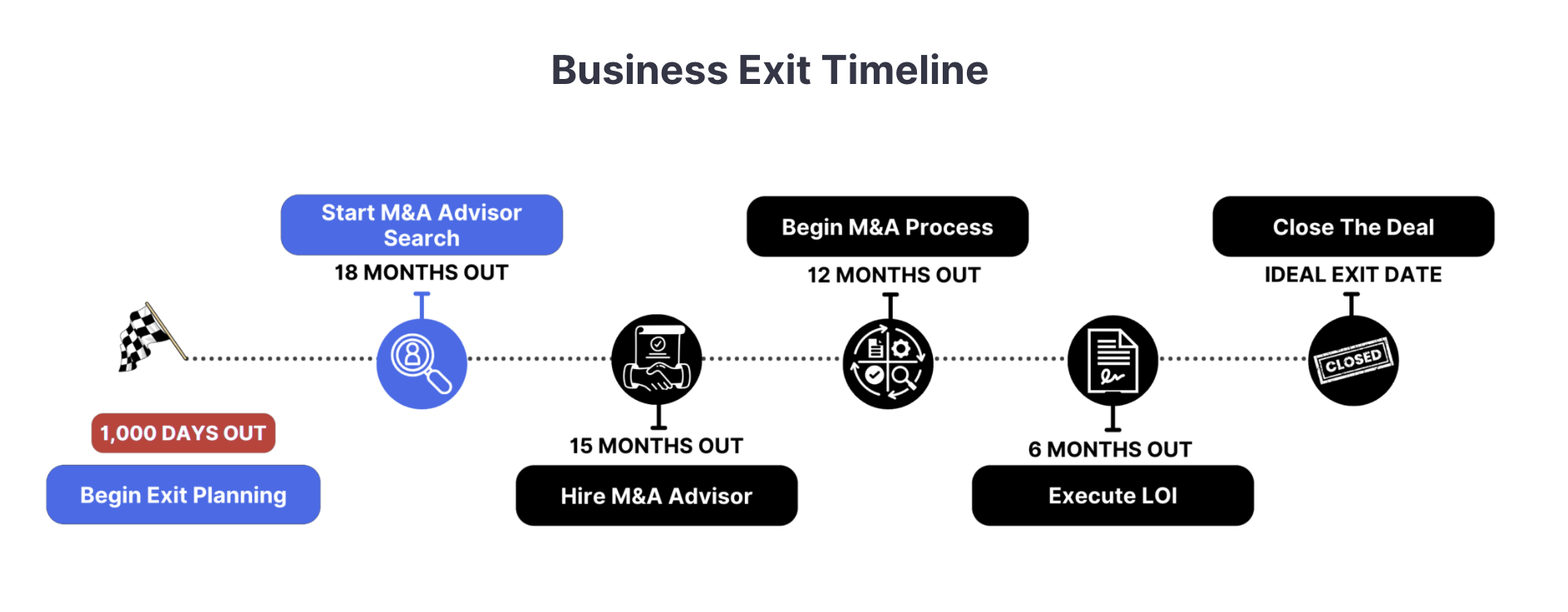
How to Sell My Healthcare Business
Selling a healthcare business presents unique challenges. Learn how to navigate these obstacles and find a specialist advisor to streamline your sale.
One of the things you need to decide when selling your business is whether or not to use a broker. For most businesses, the answer is clear: a broker is extremely beneficial, potentially even necessary. The data supports this. Owners that self-represent have a 60%–70% lower chance of successfully selling their business.
Selling a business is a lengthy process with several non-trivial steps. Even for qualified and experienced business brokers, the process requires hundreds of hours. When we’ve advised business owners who failed to sell their business on their own, they’ve likened the process to having a full-time job on top of the already full-time job of running their business.
Specifically, they said that they’ve struggled to:
For these reasons, we almost always recommend using a qualified and carefully vetted M&A broker to sell your business. There are some exceptions, which are covered below, but they’re increasingly rare, especially for small business owners.
In this post, we look at:
In this section, we explore four reasons to use a broker when selling your business:
By understanding these reasons, you’ll be better informed about what to look for when hiring a broker.
Valuing a business is complex. The best thing you can do as a business owner is arrive at the most accurate valuation range possible — not only will that help you navigate discussions with potential buyers, but it will help you decide whether or not this is the optimal time to sell your business.
To get an accurate valuation range, you need to conduct three different valuation analyses:
We discuss all three in detail in our post on valuing a business for sale.
Conducting these analyses is time-consuming and challenging, making it unlikely that a business owner can do them independently. You’ll likely lack necessary data, such as transaction details from recently closed deals, and may struggle to accurately interpret any data you do find.
For example, small business owners looking at publicly traded comparables are stuck with companies much larger than their own. To use that publicly available data in their valuation, they need to discount the comparable company’s value to account for the size difference between their business and the larger ones that are publicly traded.
A broker will have experience in doing that sort of valuation and analysis. This experience is key as all the analyses you do to arrive at your valuation will need to be explained and defended to potential buyers during the negotiation process.
The best brokers will also help you understand what is driving your valuation. This helps better inform your decision on when to sell.
A business’s value can change significantly based on several factors, and brokers can help identify ways to increase that value. This may involve:
That’s a non-exhaustive list, as what most impacts your value will depend on your business, your industry, and what kind of buyers you’re targeting.
Finally, your business’s value is dependent on viable buyers seeing your business and recognizing its worth. When marketing your business to buyers is done correctly, it can lead to a competitive bidding environment, where your value is further increased. That brings us to our next reason to work with a broker.
There are two types of ways of finding buyers:
The right approach largely depends on your business size. Brokers typically use a non-targeted strategy for smaller businesses and shift to a targeted approach for larger ones, as buyer demand becomes stronger and more focused as the business size increases.
Whatever the method, a broker can do a much better job at finding vetted buyers than business owners can do on their own. Brokers can leverage their extensive network — built over years of cultivating relationships and closing deals — to connect you with qualified buyers. That’s why finding a broker with experience in your industry is critical; their network will include buyers who are most likely to see the value in your business.
The best brokers also know how to market your business towards buyers. This means creating marketing materials that highlight the aspects of your business that potential buyers find most attractive, like demand, local economic relevance, growth synergies, etc.
A broker can help preserve your confidentiality better than you can as the owner. This is because a broker can represent a business without initially revealing the business name (only disclosing it after an NDA is signed). But if you self-represent, potential buyers immediately know that it’s your business that is for sale.
Selling your business, especially in the outreach stage with potential buyers, is a balancing act between promotion and preserving confidential information about your business. As a business owner, you can struggle to know what you ought to reveal (to attract buyers) and what you should conceal (to preserve confidentiality).
A broker is better informed on what to keep confidential, what to reveal to buyers, and at what stages specific information about your business ought to be disclosed. This mitigates the risk of sensitive information being overshared or potentially leaked to the public.
When it comes to balancing outreach with confidentiality, a broker will create three standard documents during the initial stages of the sale:
Through their experience across many M&A transactions, seasoned brokers develop a sharp sense of which buyers to advance through the early stages and when to end discussions with unqualified buyers to further safeguard confidentiality.
After you’ve spoken with interested buyers and selected one to move forward with, the process moves to negotiations.
Here, a buyer will:
Business owners are generally not experienced in handling the above. This process is rigorous and demanding, requiring you to deal with both unforeseen challenges and emotional judgments.
When it comes to negotiations, the best approach is to get ahead of any potential questions or issues that can hold up a deal. To do that, you need industry knowledge and M&A experience, both which the best brokers will have. Brokers know what can hold up a deal or motivate a buyer to ask for a lower price.
For example, one of the brokers in our marketplace recently guided an automotive business through critical regulatory changes in its sector so the owner could take steps to ensure the company wouldn’t be affected. While it took longer than anticipated to market the business and reach out to potential buyers, this information could have surfaced during negotiations, setting the sale back an estimated six months.
When it comes to accepting an offer, a broker can advise you based on their experience representing similar businesses. Let’s say a buyer offers you a smaller upfront cash payout or a larger payout spread out over time, contingent on your business reaching specific performance milestones. Which structure is better for you?
The best brokers can help you weigh these offers objectively, leveraging their knowledge of your business and the market landscape to determine which option you should take.
Business owners often underestimate the intensive effort required for a successful sale.

Valuation, vetting buyers, and due diligence take an enormous amount of time, and you still need to manage your business through the entire process to ensure it stays profitable and continues to grow. Without the right attention, your business could stagnate and discourage potential buyers.
This work equates to a second full-time job, and few people have time to devote enough effort to both running and selling their businesses. Brokers manage the processes above on your behalf, saving you time and helping you secure the best deal possible.
If you’re ready to start looking for an expert to help you sell your business, contact us today. After answering a few questions, we can provide you with a list of 3-5 firms that are experienced in selling businesses like yours.
In our 14 years of experience, we’ve often come across business owners who don’t think they’ll benefit from a broker.
Typically, these owners fall into two camps:
While it’s true that not every single business needs a broker to sell, there are still times within those situations where a broker brings plenty of benefit.
Let’s look at both.
Many business owners believe they don’t need a formal process if they already have a buyer lined up.
This could be because they’re transferring ownership to a family member or employee or because they’ve already received an unsolicited offer from a buyer.
First, a broker can still provide a lot of value when you’re selling to a family member or employee. Sales between family members or colleagues often carry a lot of emotional weight, making it difficult for business owners to stay objective. Brokers can step in to negotiate and mediate, providing an unbiased evaluation of the buyer’s offer to ensure you secure the best possible terms and value.
Second, a broker will help you vet that unsolicited offer. A business owner recently contacted us for help hiring a broker to evaluate an unsolicited offer. While the offer didn’t result in a successful sale, the owner felt reassured knowing it wasn’t a strong one to begin with. Now, the broker is actively working with the owner to secure a more suitable buyer.
Owners who have sold a business before understand the nuances needed to navigate a successful sale process.
However, even with prior experience, the market and regulatory environments are constantly changing. In many industries, just a few months can bring significant changes.
An M&A broker provides up-to-date knowledge and expertise, ensuring you navigate the complexities of the current market efficiently. This gives you critical information that ensures your sale proceeds as smoothly as possible.
If you’re still uncertain whether or not you need a broker to help you sell your business, take our Self Representation Quiz to determine if you’re ready to exit your business on your own.
Our quiz helps you evaluate how well you measure up on the key factors needed to successfully sell your business on your own. For example, you may have a team with significant selling experience, such as accountants and attorneys who have handled M&A transactions in the past. However, this means you’re never doing it completely alone.
It’s also vital to have the bandwidth to commit 20 to 30 hours per week to manage the sale without impacting business operations, as selling a business is nearly a full-time job.
For a quick idea of what our quiz assesses, review the readiness checklist below:
If you’re unsure whether these statements apply to you, it’s best to trust an experienced M&A broker who knows how to create competitive tension among buyers and manage the complexities of selling a business.

In this post, we make a case for using a broker (also sometimes more aptly referred to as an advisor) to sell your business. But this assumes that you can find a skilled broker or advisor with experience in your industry.
Not all brokers and advisors are the same. Some simply initiate the sales process by identifying and reaching out to buyers. They connect you to prospective buyers but work more as a facilitator rather than managing the due diligence that follows.
Others take a more involved and hands on approach. They have extensive experience in your specific industry and help you through the entire selling process, from business valuation, to identifying buyers to leading negotiations.
Finding the right advisor makes all the difference, but it can be difficult for business owners to know how to find the best one for them.
This is where we can help at Axial. We see over 10,000 North American businesses get marketed each year, across almost every industry, by more than 2,000 advisors & brokers. Leveraging the metadata of those businesses and the advisors who represent them, we can pinpoint the most suitable advisor for your business.
Our advisor recommendations are based on a thorough evaluation using the following data points:
This data lets us find the perfect set of advisors for you to interview as you work towards making a hiring decision.
To get started, you just provide some crucial information about your business, priorities, and transaction goals. Then, we search our pool of over 2,000 advisors & brokers and connect you to three to five professionals who have experience with businesses like yours.
Throughout this process, your information and identity stay 100% confidential until you begin interviewing candidates. You can start today.
